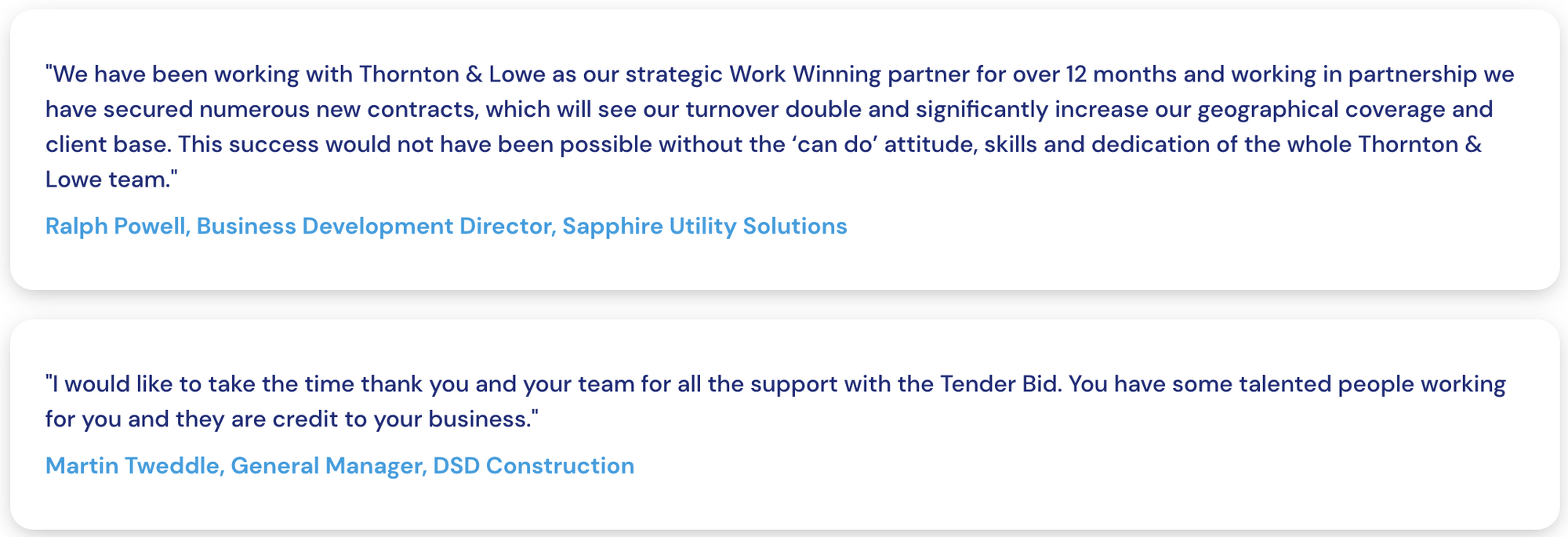Introduction to Procurement Terms for Tender Writers
Understanding procurement terminology is essential for businesses responding to tenders. Clear knowledge of these terms helps tender writers interpret buyer requirements, structure responses correctly, and improve bid quality. This guide explains key procurement terms to support businesses and bid professionals in preparing competitive submissions.
At Thornton & Lowe, we specialise in bid and tender writing, ensuring businesses submit high-quality, compliant, and compelling bids. If you need expert support, our bid and writing services can help you win more contracts.
How Thornton & Lowe Can Help with Tender Writing
At Thornton & Lowe, we provide expert bid and tender writing services to help businesses win more contracts. Our team of experienced bid writers understands procurement terminology and buyer expectations, ensuring your responses are clear, compliant, and competitive.
We support businesses with:
- Full bid writing – From strategy to submission, we manage the entire tender process.
- Bid reviews – We refine and optimise your existing content to improve success rates.
- Tender training – Upskilling in-house teams to write winning bids independently.
- Bid library development – Creating high-quality, reusable content for future tenders.
If you're looking for tender writing companies that deliver results, contact Thornton & Lowe today for expert support.

Book a free consultation today
Click hereProcurement Terms Explained for Tender Writers
Procurement and tendering come with a vast range of terms, acronyms, and industry-specific language that can be overwhelming, even for experienced bid writers. This article explains key procurement terms clearly and practically, helping you navigate tenders with confidence. If you need further advice or support, contact us today.
Term | Explanation |
Discussions between buyers and potential suppliers before the formal tender process begins. | |
A request issued to suppliers to gather preliminary details before moving to a formal procurement stage. | |
A group of businesses working together to submit a joint bid. | |
Bid Decision Matrix | A tool used to evaluate whether an organisation should pursue a tender opportunity. Think 'bid or no bid'. |
A document suppliers submit to indicate their interest in bidding for a contract. | |
Capture Planning | The strategic process of identifying and preparing for an upcoming bid opportunity. |
Supplier Engagement | The process of working collaboratively with suppliers before, during, and after procurement to achieve mutual goals. |
Planned Procurement Notice (UK1) | A notice providing early market awareness of upcoming tenders, allowing suppliers time to prepare. We have a full guide to the new Tender Notices. |
Supply Chain Planning Notice | Required for authorities with annual spending over £100 million, outlining procurement strategies for the next 18 months. |
Market Research and Supplier Engagement Notice | Allows suppliers to contribute input during pre-tender discussions. |
The UK government’s executive agency that manages public sector procurement frameworks. | |
A major public sector buying organisation providing frameworks for schools, local authorities, and the wider public sector. | |
A public sector-owned professional buying organisation offering a range of procurement solutions. | |
A new format for supplier pre-qualification in public procurement, replacing the Selection Questionnaire (SQ). | |
A former method for shortlisting suppliers before inviting them to tender. | |
The standard pre-qualification process for assessing supplier suitability. | |
Bidder Qualification | The process of determining whether a supplier meets eligibility and experience requirements. |
A structured process used by companies to assess whether they should pursue a tender opportunity. | |
A list of suppliers pre-approved for future procurement opportunities. | |
A procurement strategy that promotes awarding contracts to a wide range of businesses, including SMEs, minority-owned, and women-led organisations. | |
Procurement Timetable | A structured timeline outlining key deadlines and milestones in a procurement process. |
An announcement providing advance notice of an upcoming procurement opportunity. | |
Tender Notice (UK4) | A formal notice required for both high and low-value tenders to initiate a procurement process. |
Preliminary Market Engagement (PME) Notice (UK2) | Used to signal an upcoming procurement and gather early market feedback. |
Contract Performance Notice (UK7) | Required for contracts over £5 million, reporting against KPIs annually. |
Contract Termination Notice (UK9) | Must be published within 30 days of contract termination. |
Payments Compliance Notice (UK10) | Authorities must confirm compliance with 30-day payment rules. |
Dynamic Market Entry Notices | Provide suppliers with details on applying for new trading environments. |
Cancelled Procurement Alerts | Issued when authorities decide to abandon a tender process. |
A formal request inviting suppliers to submit detailed proposals for a contract. | |
A request for detailed proposals, often used in complex procurements. | |
A request focused primarily on price submissions for a specific set of goods or services. | |
A contract that establishes terms for multiple procurements over a fixed period without guaranteeing work. It's an approved supplier list used by multiple public sector bodies. | |
Call-Off Contract | A contract awarded under a framework agreement that allows buyers to purchase goods or services as needed. |
A mandatory pause after the contract award decision, allowing unsuccessful bidders to request feedback or raise challenges. | |
A new procedure introduced by the Procurement Act 2023, allowing contracting authorities to design a more flexible procurement process. | |
Competitive Procedure with Negotiation | A process where bidders can negotiate contract terms before final submission. |
Best and Final Offer (BAFO) | The final offer submitted by a bidder after negotiations. |
Post-Tender Negotiation (PTN) | A stage where terms are refined before final contract award. |
A centralised collection of pre-written responses, case studies, and compliance documents used to improve bid efficiency. At Thornton & Lowe we have Tender Library as a SAAS solution for our clients. | |
MEAT | A procurement approach that evaluates bids based on a combination of price and quality. A key consideration when pricing. |
MAT | A broader evaluation method considering additional factors like social value. |
Performance Bond | A financial guarantee ensuring the supplier completes the contract as agreed. |
KPIs | Metrics used to measure contract performance. |
Best Value Criteria | A procurement assessment that evaluates tenders based on cost, quality, and additional benefits. |
Financial Standing | A supplier’s financial health, assessed to determine their stability and ability to deliver a contract. FVRA is a common method used by the UK Public Sector. |
Contract Award Notice (UK6) | A public notice announcing the successful bidder and contract details, required within 30 days of contract award. |
Contracting Authority | A government entity responsible for conducting procurement activities. |
Market Test | Part of the procurement planning stage - this involved buyers contacting potential supplier and discussing the opportunity to help them refine their procurement exercise. |
Wash-Up | A post-bid review meeting to assess lessons learned and improvements for future tenders. |
Win Strategy | The overall plan for securing a contract by highlighting a company’s unique strengths. |
A clear and compelling aspect of a bid that differentiates it from competitors. | |
Procurement Pipeline | A forward-looking schedule of upcoming tender opportunities, often published by public sector buyers to provide suppliers with planning time. |
Competitive Dialogue | A procurement process where buyers enter discussions with shortlisted bidders to refine solutions before finalising contract requirements. |
UK legislation requiring public sector buyers to consider social, economic, and environmental benefits when awarding contracts. | |
The process of submitting a bid for a contract. | |
Quotation Return Label | A label used to ensure quotations are correctly submitted. |
Procurement Timetable | A schedule outlining key procurement milestones. |
Business Questionnaire | A form to collect company and compliance information from bidders. |
Contract Award | The process of selecting a winning bidder and formalising the contract. |
Contract Mobilisation | The transition period after contract award where the supplier prepares to begin service delivery, including staff training and resource allocation. |
Conditions of Contract | The legal terms governing contract performance. |
Articles of Agreement | The formal agreement outlining the terms of the contract. |
Contract Particulars | Specific details of the contract, including key dates and responsibilities. |
Contract Conditions Acceptance | A declaration by the supplier agreeing to contract terms. |
Form of Tender | A legally binding offer to supply goods or services under stated conditions. |
Collusive Tendering Certificate | A declaration that the bid was prepared independently and fairly. |
Evaluation Panel | A group of evaluators responsible for scoring and assessing bid submissions against set criteria to ensure a fair procurement process. |
Freedom of Information Act (FOIA) | Legislation allowing public access to certain contract-related information. |
Data Protection Legislation (UK GDPR) | Laws governing the handling of personal data in procurement. |
Force Majeure | A clause protecting parties from contract breaches due to uncontrollable events. |
Termination for Breach | Contract termination due to supplier non-compliance. |
Supplier Contact Information | Details of the supplier’s representatives. |
Award Criteria | The scoring system used to evaluate tenders. |
Clarification Meetings | Discussions to clarify bid submissions before final evaluation. |
The process of assessing bids against predetermined criteria. | |
MEAT | The best balance of cost and quality in procurement. |
KPIs | Measurable benchmarks for contract performance. |
Abnormally Low Tender | A bid priced so low that its sustainability is questioned. |
Sub-Contracting and Assignment | The use of third parties to fulfill parts of a contract. |
Corporate Policies Compliance | Requirements for suppliers to adhere to organizational policies. |
Pricing Schedule | A document listing costs for goods or services. |
Payment Details | Information on how suppliers will be compensated. |
Fixed Price Period | A set period during which contract prices cannot change. |
Indexation | Adjusting prices based on inflation or market changes. |
Limitations of Liability | A clause capping the supplier’s financial responsibility for contract breaches. |
Indemnities | Provisions requiring one party to compensate another for specific losses. |
Modern Slavery Act 2015 | UK legislation requiring large businesses to report on actions to prevent slavery in their supply chains. |
Bribery Act 2010 | Legislation preventing corruption and bribery in procurement. |
Whistleblowing Policy | A policy allowing employees or suppliers to report unethical practices. |
Equality and Diversity Policy | A requirement ensuring non-discriminatory business practices. |
Health and Safety Policy | A requirement for compliance with workplace safety laws. |
Environmental Policy | Supplier commitments to sustainability and environmental protection. |
Safeguarding Policy | Requirements for protecting vulnerable individuals when contracts involve sensitive services. |
Declaration of Compliance | A statement confirming adherence to procurement requirements. |
Supporting Information | Additional documents required for bid submission. |
Confidentiality Agreement | A legal document ensuring information security. |
References and Past Performance | Supplier history and past contract evaluations. |
Financial Assessment | A review of a supplier’s financial health before awarding a contract. |
Parent Company Guarantee | A financial guarantee provided by a supplier’s parent company to ensure contract performance. |
Performance Bond | A financial security that guarantees contract completion in case of supplier default. |
Contract Termination Letter | A formal notice ending a supplier agreement, often due to non-compliance. |
Electronic Tendering | The submission of tenders through an online platform like Delta eSourcing. |
Conditions of Tender | The requirements suppliers must meet when submitting a bid. |
Tender Checklist | A list of required documents that must be submitted with a bid. |
Queries submitted by bidders to clarify tender requirements. | |
Tender Interviews | A meeting between procurement teams and bidders to assess suitability. |
Moderated Scoring | A process where evaluation panel members agree on final scores after individual assessments. |
From a framework agreement, awarded suppliers for a specific lot are invited to compete for a specific opportunity. | |
Call for Further Competition | A process where framework suppliers compete for a specific contract. |
A procurement method allowing a contract to be awarded to a supplier without competition. | |
Waiver Request | A formal request to bypass standard procurement rules, often for framework access. |
Contract Award Notice | A formal notification published to inform the market of a successful contract award. |
Transfer of Undertakings (Protection of Employment) Regulations (TUPE) | Legislation protecting employees when a contract changes suppliers. |
Pension Protection Regulations | Rules ensuring employees retain pension benefits when transferring under TUPE. |

How Understanding Procurement Terms Helps Win Tenders
A strong understanding of procurement terminology is essential for writing clear, compliant, and persuasive bids. Misinterpreting key terms can lead to non-compliant responses or missed opportunities. Here’s how knowledge of procurement language improves tender success:
- Ensures compliance – Understanding terms like ITT (Invitation to Tender), PQQ (Pre-Qualification Questionnaire), MEAT (Most Economically Advantageous Tender), and framework agreements helps ensure all requirements are met.
- Improves clarity and precision – Using the correct terminology demonstrates professionalism and reassures evaluators of your expertise.
- Strengthens bid strategy – Recognising terms such as weighted criteria, social value, and contract variations allows businesses to tailor responses effectively.
- Reduces risk of disqualification – Failure to understand procurement-specific requirements can lead to costly mistakes and rejected bids.
At Thornton & Lowe, our bid writing services ensure every submission is clear, compliant, and strategically written to maximise success. Speak to a professional Tender Writer today!
The Role of a Tender Writer in the Procurement Process
A tender writer plays a key role in helping businesses bid and win contracts by responding to formal tenders. This involves writing clear, compelling, and compliant bid responses. Their responsibilities include:
- Understanding buyer requirements – Carefully reviewing tender documents to ensure all specifications and evaluation criteria are met.
- Content development – Writing detailed responses that highlight experience, capabilities, and value for money.
- Compliance and accuracy – Ensuring all responses align with procurement regulations and include the necessary supporting evidence.
- Project management – Coordinating input from subject matter experts, finance teams, and senior management to produce a high-quality submission.
- Bid strategy – Tailoring responses to make the bid as competitive as possible, addressing the buyer’s key priorities.





